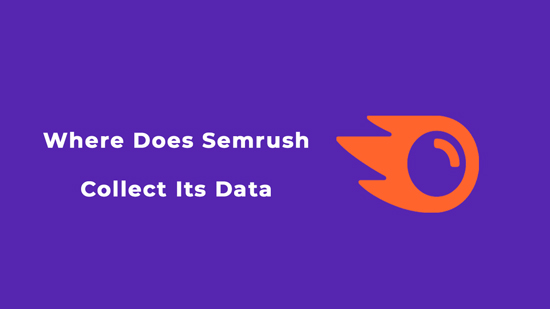I have been using Semrush for years, and today I’ll run a few websites through SEMRush and compare the results it provides with other tools.
Is SEMrush accurate
Semrush is not 100% accurate, but its metric can be highly relevant to a business’s performance. Results from Semrush, and any other third-party SEO Tool can’t be accurate by more than 50 percent. This is because Google has a very strong algorithm for its SERP, and it is impossible to crack it and guess how it works. The main advantage of this tool is its ability to analyze a site’s competitive position. Semrush also offers some of the best advertising-related tools.
Information provided by Semrush about its traffic estimates accuracy
Let’s look at the various metrics offered by Semrush and compare them with other tools.
Comparison 1: Keyword Research
- The keyword research tools of both Ahrefs and Semrush are quite similar in terms of what they offers. However, in Ahrefs, the keyword research feature determines the level of difficulty to rank for a given keyword and tells you the number of backlinks you’ll need to rank on the first page of search results. Semrush doesn’t offer this feature, and thus Ahrefs wins the battle of keyword research.
Comparison 2: Keyword Difficulty
- Semrush offers more accurate keyword difficulty data in comparison to Ahref. SEMrush has a Traffic Analysis competitor module, whereas Ahrefs does not have this feature. Semrush’s Keywords Explorer tool helps you find the best keywords and analyzes their difficulty scores.
- One thing you’ll like about Ahrefs’ approach to keyword difficulty score is that it not only tells you how difficult it will be to rank for a given keyword but also tells you how many backlinks you’ll need to rank in the top ten search results.
Semrush did not have such a feature, but recently, it has introduced a similar one.
However, Ahrefs will give you the data on the number of backlinks needed to rank for a particular phrase. But Semrush currently offers this data only for some keywords.
Comparison 3: CPC
- Ahrefs shows you CPC, competition, and search volume. But Semrush shows you tons of data on each term, such as the search volume trend and the number of results. If you prefer to focus on the key metrics, Semrush’s UI can be a bit cluttered.
- Ahrefs CPC data is not that reliable. We can conclude this from Ahrefs’ own statement: ” Unfortunately, we don’t have a way to update our CPC for the vast 9+ billion keywords single month (we do so once in a few months), and the number that you see can be treated as the average. Semrush, on the other hand, updates its CPC data every 30 days. It updates higher-volume keywords even more frequently.
I checked a few software-related keywords on Semrush and compared them to what Google Keyword Planner reports. And the results were pretty accurate:
Google Keyword Planner data
Backlink profile
- Ahrefs provide in-depth backlink data for any site, whereas Semrush only shows the number of backlinks a site has. It does not provide an in-depth analysis of backlinks.
While analyzing Problogger.com on Semrush, I found around 18.4k referring domains and 736k backlinks.
On Ahrefs, I found 33.2k referring domains and 1.32 million backlinks for the same website.
So we can conclude that Ahrefs has a larger link index. This is not true in all cases. In a few cases, I found Semrush returning a larger number for backlinks and referring domains.
Comparison 4: Traffic
- Both Semrush and Ahrefs show organic traffic, divided by keywords, monetary value, country, traffic, and more. The figures are slightly different from each other but generally close.
- Ahrefs allows you to see the traffic value of a domain immediately. In Semrush, you will have to pull a separate report to view this data.
Ahrefs shows the domain traffic value as part of a domain overview report.
Domain analysis in Semrush
There is a great feature in Semrush’s domain analysis that Ahrefs doesn’t provide. Its ‘competitive positioning map. This indicates how a website performs against key competitors based on the monthly traffic estimates and the number of keywords it ranks for.
Comparison 5: Competitive Analysis
SEMush can accurately determine your competitors (based on the keywords you want to rank for). The competitive analysis tool of Semrush helps determine what keywords your competitors rank for, how much traffic they get, and where their backlinks are coming from.
Ahrefs is also amazing for competitive research. To analyze your competitors, you have to open the Ahrefs site explorer feature. In the search box, enter the domain URL and hit the search button. In the overview section, you can see URL rating, backlinks, referring domains, domain rating, organic traffic, organic keywords, traffic value, Ahrefs rank, and so on.
So both Ahrefs and Semrush are great for competitor analysis, so it’s a close tie between them for this category.
What do you think? Is Semrush accurate?
Semrush is a leading SEO tool that can help you get the ideal website traffic with the best efforts. Though it is not 100% accurate, it’s perfect for research, and you can consider its results an assumption. There are various metrics available with it, making it better than other Semrush alternatives. The most important among them is the keyword difficulty. If the keyword difficulty is lower, there will be a higher chance of your page being found on Google. Semrush is a tool worth paying for as it can transform the growth trajectory of your site. You will always find the data it provides more helpful than hurtful.





